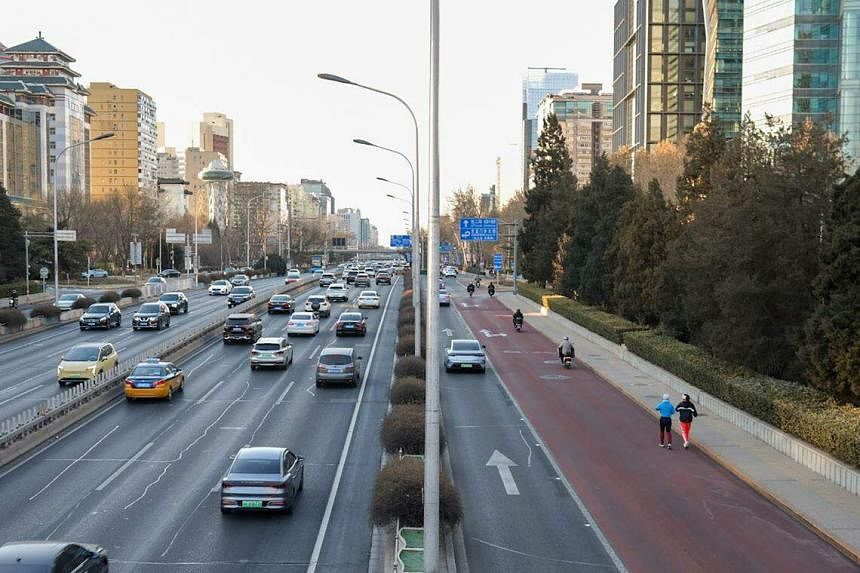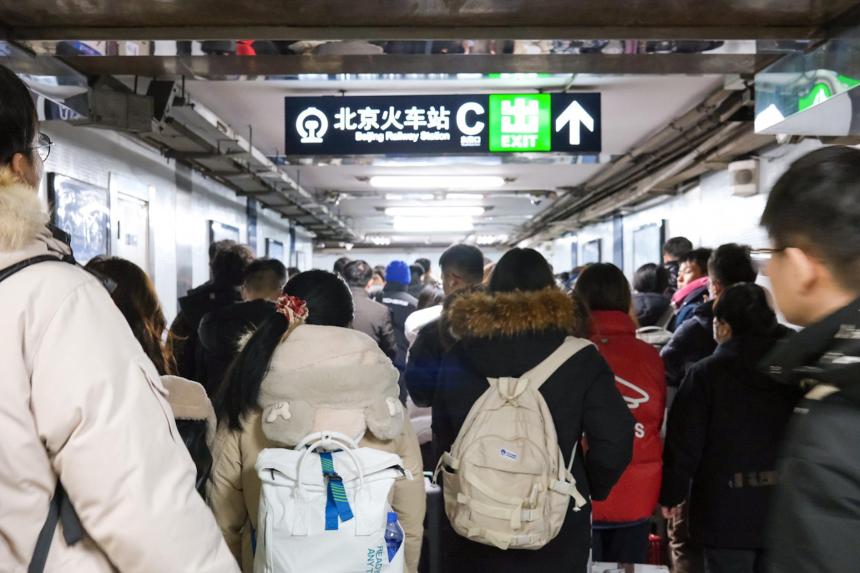BEIJING - Joggers, people walking their dogs and families out for a stroll after dinner are usually a common sight along Beijing’s Liangma River.
But there is hardly anyone in the area in recent days.
In the Chinese capital city, public parks, buses and subway trains have also become emptier, with traffic a breeze on Beijing’s Second Ring Road, which is notorious for jams on normal days.
Busy Beijing, a city of 22 million people, is finally taking a breather as migrants head home for what has been dubbed as China’s first “real” Chinese New Year celebrations since the Covid-19 pandemic.
A 30-seater cafe along Liangma River, which usually draws customers from the surrounding office and residential buildings and foreign embassies, sold just two beverages on the morning of Feb 6.
“That’s about 90 per cent lower than our usual sales,” said waitress Li Feifei, 28, who added that the cafe is usually at its busiest in the morning.
“We thought that the crowds would stay until at least a day before Chinese New Year eve, the day of the reunion dinner. But it seems like no one is in the mood to work, or they have sneaked back home.”
The world’s largest annual human migration, China’s yearly Chinese New Year travel rush, called chunyun, is expected to break records in 2024.
The number of trips over the 40-day travel period, from Jan 26 to March 5, is expected to hit a record nine billion – via road, rail, water or air.
The figure would be nearly double that of the 4.07 billion chunyun trips in 2023.
The surge in travel comes a year after China finally lifted strict Covid-19 restrictions in late 2022.
Worries about new waves of infections had dampened travel sentiment during Chinese New Year in 2023.
For the upcoming Year of the Dragon, considered the most auspicious animal in the Chinese zodiac, little is stopping millions of Chinese from returning to their home towns or going on holidays to celebrate the spring festival.
A total of 480 million train trips, the main mode of transportation in China, are expected to be made across the country during chunyun – a 38 per cent jump from 2023 and up 17 per cent from 2019 before the pandemic, according to state broadcaster China Central Television.
Baker Gao Yuan, 29, is “really excited” to return home to Karamay city in Xinjiang, an autonomous region in north-western China.
It would be her first trip home for Chinese New Year since she first came to Beijing for work in 2019. Worries about being banned from returning to the capital city, under the country’s zero-Covid curbs, had made her stay put previously.

Ms Li, the waitress from Beijing, is looking forward most to time off work and a day trip to neighbouring Tianjin city, about a 1½-hour drive from the capital city, to set off firecrackers with her family.
Firecrackers are banned in Beijing.
“Without firecrackers, it really does not feel like Chinese New Year,” she said.
When Ms Li was growing up, the elders in her family would give the children cigarettes to light up fireworks because “they didn’t trust us with matchsticks or lighters”, she recalled.
“Over time, I have associated the smell of nicotine with firecrackers and, by extension, CNY,” Ms Li, a non-smoker, said with a laugh.
Some out-of-towners are staying put in Beijing.
Mr Wu Bo, 37, an insurance agent who has lived in Beijing for 12 years, is looking forward to his mother’s visit from his native Harbin, capital of Heilongjiang province in north-east China.
“I miss her ‘luan dun’ and that’s what we are having for reunion dinner,” said Mr Wu, referring to a speciality stew from north-east China that usually contains potatoes, eggplant and ribs.
His mother has decided to visit him in Beijing, as air and rail tickets to Harbin are “especially difficult to get due to the craze over the city’s annual Ice and Snow Festival”.
“Besides, it’s just me and her,” he added.
A record three million people visited the world-famous festival over three days from Dec 30, 2023, to Jan 1, 2024, and crowds have continued to swarm the city, local media reported. The festival is expected to end later in February.
Mr Wu said: “I’ll let the tourists enjoy what I have grown up with and spend some quiet quality time with my mother in Beijing this holiday.”


